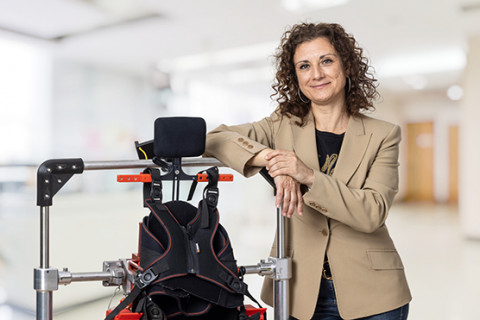
photo: Elena García Armada, https://www.epo.org/
Finalist for the European Inventor Award 2022
Category: Research
Sector: Robotics/medical devices
Company/institution: Marsi Bionics / Consejo Superior de Investigaciones Científicas (CSIC)
Patent numbers: EP3225363B1, EP3009240B1
Spanish professor Elena García has developed an adaptable robotic exoskeleton for children who use wheelchairs. The exoskeleton enables the children to walk during muscle rehabilitation therapy, improving their well-being and extending their life expectancy.
Children who use wheelchairs commonly experience muscle degradation in their torso and deformities of the spine, affecting their lungs and heart. This reduces their life expectancy and quality of life. While exoskeletons for adults have existed since the 1960s, there are no lightweight adaptable devices for growing children. Professor Elena García Armada, a robotics expert at the Spanish National Research Council (CSIC) in Madrid, had been developing exoskeletons for workers in heavy industry. After a chance meeting with Daniela, a young child who was unable to walk following an accident, García shifted her research to paediatric exoskeletons. She spent close to a decade developing a battery-powered suit that adapts to different wearers as their health conditions evolve.
Approximately 17 million children worldwide face the same problem as Daniela. García's robotic exoskeleton can delay, and sometimes even prevent, medical complications resulting from reduced mobility. The suit is fitted in under eight minutes and adjusts the stiffness of its joints to the strength of its wearer's muscles, giving young patients the mechanical strength to safely leave their wheelchairs and walk. For children living with spinal cord injuries or neuromuscular disorders such as cerebral palsy, the opportunity to walk not only extends their life expectancy and enhances their physical well-being, but also improves their self-esteem.
Step by step
Initially, García intended to license the technology to an established manufacturer. However, after co-founding the spin-off Marsi Bionics to test the exoskeleton, she soon realised she could manufacture it herself. The product was cleared for use in medical centres in 2021 and the company then soon shipped its first units to hospitals in Spain and Mexico.